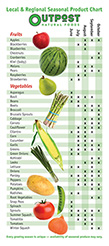The above information will be used only by Outpost Natural Foods for the express purpose of sending an e-newsletter. Outpost shopper information is never shared with other organizations or businesses.
Graze >>
Saving Seeds = Saving Our Planet

An e-mail recently appeared in my inbox that really got me thinking about the sustainability of current conventional farming practices. The e-mail contained a link to a report by the Center for Food Safety as part of its Save Our Seeds (SOS) initiative. The report, Seed Giants vs. U.S. Farmers, highlights the ongoing practice of seed companies suing farmers for patent infringement when their fields are discovered to contain genetically engineered (GE or trangenic) crops, even though the farmers hadn't purchased GE seeds from the companies. The seed companies allege that farmers are knowingly saving seeds from prior year GE crops, or are obtaining GE seeds from “seed cleaners,” who specialize in the practice of processing seeds from prior years to use for subsequent plantings. According to the seed companies, these practices are expressly prohibited by the technology agreements signed by farmers who use GE seeds.
Many of the targeted farmers argue that their crops have become intermixed with GE varieties from neighboring fields through pollen drift or animal/equipment transport, a possibility which is acknowledged in the companies' technology agreements. Such transgenic drift is potentially very damaging for organic farmers, who risk losing organic certification if their crops are found to contain GE strains.
Whatever one's opinion of the value and efficacy of the genetic engineering of our food supply, I think most would agree that farmers (and consumers) should have the option of avoiding GE crops and foods if they choose to do so. The report exposes the difficulty of controlling transgenic drift as conventional farms turn increasingly to GE crops, which essentially forces neighboring farmers to grow GE crops, regardless of whether they intended to. Depending on the outcome of several cases currently in the courts, these neighboring farmers may also be forced to pay seed companies for this “privilege.”The dominance of GE strains in crops such as corn and soybeans creates a number of other issues as well. For example, the resulting loss of biological diversity exposes our food supply to the potential for significant losses should a new threat emerge that is adapted to a dominant GE strain (also a threat in any conventional monoculture system). In addition, since most genetic engineering is for the purpose of conferring resistance to specific pesticides (sold by the seed companies), pesticide use is over 26% higher for GE crops than for conventional crops, which potentially increases human exposure and affects the health of ecosystems, especially watersheds. Higher pesticide use can, over time, also result in the emergence of “super weeds,” which require even higher levels of pesticides (and presumably, more genetic engineering of seeds) to combat. There is ample evidence that super weeds, are, in fact, emerging.
Food cooperatives exist largely because consumers want more information on, and more control over, the foods that they eat. Now, more than ever, it seems that we risk losing collective control over the “source code” contained in seeds, a code which is ultimately critical to our entire food supply. Perhaps not surprisingly, cooperatives, including Outpost, are at the forefront of efforts to maintain the biodiversity of this critical source code and to inform consumers about the GE (GMO) ingredients in the foods that they eat. From making organic and heirloom varieties of produce and grains available, to fighting for mandatory GMO labeling and implementing voluntary labeling in the meantime, Outpost and other food cooperatives are fulfilling a primary mission. That mission is to ensure a healthy, sustainable and diverse community. In this case, those values apply to the seeds themselves, which are the basic, and irreplaceable, building blocks of the entire food system.
For more information and to access the full report, click on this link. What's your opinion on GE seeds regarding the sustainability and control of our food system?
Comments
Bloggers
Archived Columns
Tags
Archives
-
April 2024 (1)
March 2024 (1)
February 2024 (1)
December 2023 (1)
August 2023 (1)
March 2023 (1)
February 2023 (1)
November 2021 (1)
September 2021 (1)
November 2020 (1)
October 2020 (1)
July 2020 (1)
June 2020 (1)
May 2020 (1)
February 2020 (1)
January 2020 (1)
December 2019 (1)
November 2019 (1)
October 2019 (1)
August 2019 (2)
May 2019 (1)
March 2019 (2)
January 2019 (1)
December 2018 (1)
November 2018 (1)
October 2018 (2)
September 2018 (1)
February 2018 (1)
November 2017 (2)
October 2017 (1)
July 2017 (2)
March 2017 (1)
February 2017 (1)
January 2017 (1)
December 2016 (2)
November 2016 (1)
August 2016 (2)
July 2016 (2)
March 2016 (2)
February 2016 (2)
January 2016 (1)
December 2015 (1)
October 2015 (3)
August 2015 (1)
July 2015 (2)
June 2015 (1)
March 2015 (2)
February 2015 (2)
January 2015 (2)
December 2014 (2)
November 2014 (1)
October 2014 (3)
August 2014 (2)
July 2014 (1)
June 2014 (2)
May 2014 (2)
April 2014 (1)
March 2014 (2)
February 2014 (2)
January 2014 (2)
December 2013 (1)
November 2013 (2)
October 2013 (1)
July 2013 (2)
June 2013 (1)
May 2013 (2)
April 2013 (1)
March 2013 (2)
February 2013 (1)
January 2013 (2)
December 2012 (3)
November 2012 (1)
October 2012 (3)
September 2012 (2)
August 2012 (4)
July 2012 (4)
June 2012 (6)
May 2012 (3)
April 2012 (4)
March 2012 (6)
February 2012 (8)
January 2012 (3)
December 2011 (4)
October 2011 (4)
September 2011 (3)
August 2011 (5)
July 2011 (7)
June 2011 (1)
May 2011 (2)
April 2011 (7)
March 2011 (10)
February 2011 (12)
January 2011 (11)
December 2010 (19)
November 2010 (13)
October 2010 (22)
September 2010 (16)
August 2010 (24)
July 2010 (33)
June 2010 (5)
May 2010 (52)
April 2010 (37)
March 2010 (55)
February 2010 (44)
January 2010 (46)
December 2009 (40)
November 2009 (26)
October 2009 (37)
September 2009 (34)
August 2009 (24)
July 2009 (21)
June 2009 (29)
May 2009 (30)
April 2009 (33)
March 2009 (16)
February 2009 (2)
January 2009 (5)
November 2008 (1)
October 2008 (1)
September 2008 (2)
August 2008 (3)
July 2008 (2)
June 2008 (6)
May 2008 (2)
April 2008 (10)
March 2008 (5)
February 2008 (5)
January 2008 (12)
December 2007 (5)
October 2007 (3)
August 2007 (3)
July 2007 (1)
June 2007 (5)
May 2007 (4)
April 2007 (6)
March 2007 (3)
February 2007 (3)
January 2007 (4)
December 2006 (2)
October 2006 (2)
September 2006 (5)
August 2006 (8)
0 (1)










